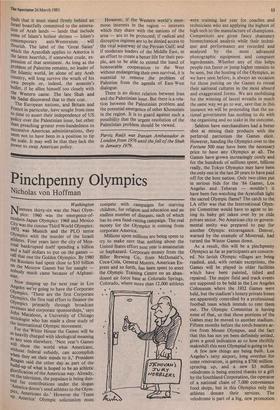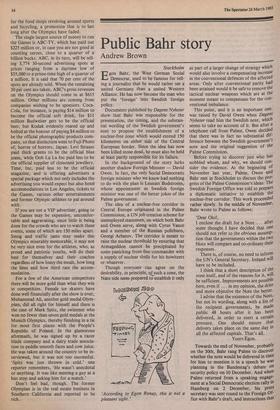Pinchpenny Olympics
Nicholas von Hoffman
Washington Nineteen thirty-six was the Nazi Olym- pics: 1960 was the emergence-of- modern-Japan Olympics: 1968 and Mexico CitY was the riotous Third World Olympics: 1972 was Munich and the PLO terror Olympics with the murder of the Israeli athletes. Four years later the city of Mon- treal bankrupted itself spending a billion and a half dollars to put on the games call that one the Golden Olympics. By 1980 the Russians had spent close to $10 billion on the Moscow Games but for naught —
nobody much came because of Afghani- stan.
Now shaping up for next year in Los Angeles we're going to have the Corporate QYmpics. 'These are the first Corporate Olympics, the first real effort to finance the °IYmpics primarily through broadcast revenues and corporate sponsorships,' says J°hrl Macaloon, a University of Chicago sociologist who has made a close study of the International Olympic movement. For the White House the Games will be as heavily charged with ideological meaning as any seen elsewhere. 'Next year's Games Will show the world what Americans, Without federal subsidy, can accomplish when they set their minds to it,' President Reagan said the other day 'as part of the build-uP of what is hoped to be an athletic glorification of the American way. Already, on the television, the populace is being dun- ned for contributions under the slogan America doesn't send athletes to the Olym- pics, Americans do.' However the 'Team uP America' Olympic solicitation must compete with campaigns for starving children, for religion and education and an endless number of diseases, each of which has its own fund-raising campaign. The real money for the Olympics is coming from corporate America.
Millions upon millions are being spent to try to make sure that nothing about the United States effort next year is amateurish or haphazard. Corporate money from the Biller Brewing Co, from McDonald's, Coca-Cola, General Motors, American Ex- press and so forth, has been spent to erect the Olympic Training Centre on an aban- doned air force base at Colorado Springs, Colorado, where more than 12,000 athletes were training last year for coaches and technicians who are applying the highest of high tech to the manufacture of champions. Competitors are given fancy shamancy biomechanical analysis while their techni- que and performance are recorded and analysed by the most advanced photographic equipment and computer legerdemain. Whether any of this helps people run faster or jump higher remains to be seen, but the hosting of the Olympics, as we have seen before, is always an occasion for those putting on the Games to reveal their national cultures in the most absurd and exaggerated forms. We are mobilising for the winning of laurel wreaths in much the same way we go to war, save that in this instance we will be pretending that the na- tional government has nothing to do with the organising and no stake in the outcome.
Seldom have merchandisers had a better shot at mixing their products with the perfervid patriotism the Games elicit. However, handing the Olympics over to the Fortune 500 may have been the necessary price to have any Olympics at all. The Games have grown increasingly costly and for the hundreds of millions spent, billions really, the Tokyo Olympics may have been the only one in the last 20 years to have paid off for the host nation. Only two cities put in serious bids for the '84 Games, Los Angeles and Teheran — wouldn't it have been fun watching the Ayatollah light the sacred Olympic flame? The catch to the LA offer was that the International Olym- pic Committee would have to agree to let- ting its baby get taken over by ye olde private sector. No American city or govern- mental entity was prepared to pay for another Olympic extravagance. Denver, warned by the example of Montreal, had turned the Winter Games down.
As a result, this will be a pinchpenny Olympics as far as participants are concern- ed. No lavish Olympic villages are being readied, and, with certain exceptions, the Games will be played in older facilities which have been painted, tidied and repaired. The major field and track events are supposed to be held in the Los Angeles Colosseum where the 1932 Games were held, but the stadium's luxury private boxes are apparently controlled by a professional football team which intends to rent them out. The Olympic Committee is having none of that, so that those portions of the Games may be moved to another stadium. Fifteen months before the torch-bearers ar- rive from Mount Olympus, and the fact that this has not yet been definitely settled, gives a good indication as to how thriftily makeshift this next Olympiad is going to be.
A few new things are being built. Los Angeles's tatty airport, long overdue for some renovation, is getting a $700 million sprucing up, and a new $3 million velodrome is being erected thanks to a gift by the Southland Corporation, the operator of a national chain of 7,000 convenience food shops, but in this Olympics only the athletes donate their services. The velodrome is part of a big, new promotion
for the food shops revolving around sports and bicycling, a promotion that is to last long after the Olympics have faded.
The single largest source of money to run the Games is ABC-TV, which has paid out $225 million or, in case you are not good at counting zeroes, close to a quarter of a billion bucks. ABC, in its turn, will be sell- ing 3,774 30-second advertising spots at prices ranging from a daytime low of $35,000 to a prime-time high of a quarter of a million, It is said that 70 per cent of the spots are already sold. When the remaining 30 per cent are taken, ABC's gross revenues on the Olympics should come in at $615 million. Other millions are coming from companies wishing to be sponsors. Coca- Cola, for instance, is paying $14 million to become the official soft drink, for $11 million Budweiser gets to be the official beer, but Kodak evidently reared up and bolted at the honour of paying $4 million to be the official photographic products com- pany, so that distinction went to Fuji Photo of, horror of horrors, Japan. Levi Strauss paid thick greens to be the official blue jeans, while Ooh La La Inc paid less to be the official supplier of cloisonné jewellery. Time, Inc, paid less to be the official magazine, and is offering advertisers a special package which not only includes the advertising you would expect but also hotel accommodations in Los Angeles, tickets to the Games, various other entertainments and former Olympic athletes to pal around with.
If you are not a VIP advertiser, going to the Games may be expensive, uncomfor- table and aggravating, since little is being done for the crowds who are to watch these events, some of which are 150 miles apart. Smog and traffic jams may make this Olympics miserably memorable, it may not be very nice even for the athletes, who, as proud and patriotic youths, will do their best for themselves and their coaches regardless of how lousy the meals, how long the lines and how third rate the accom- modation.
For a few of the American competitors there will be more gold than what they win in competition. Female ice skaters have done well financially after the show is over, Muhammad Ali, another gold medal Olym- pian, did all right for himself and there is the case of Mark Spitz, the swimmer who won no fewer than seven gold medals at the Munich Olympics, thereby finishing in a tie for most first places with the People's Republic of Poland. In the glamorous aftermath, he was signed up by a razor blade company and a dairy trade associa- tion to peddle smooth faces and cow juice. He was taken around the country to be in- terviewed, but it was not too successful. `Spitz was just thrown in cold.' one reporter remembers, 'He wasn't anecdotal or anything. It was like meeting a guy at a bus stop and asking him for a match.'
Don't feel bad, though. The former Olympian is in the real estate business in Southern California and reported to be rich.















































 Previous page
Previous page